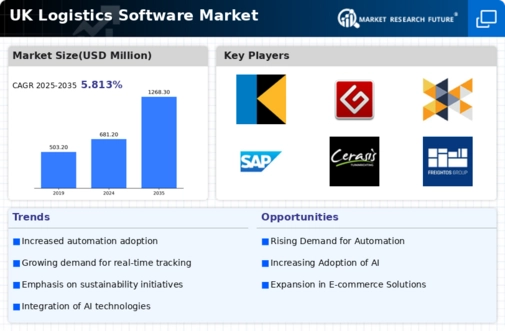Growing E-Commerce Sector
The UK logistics software market is experiencing a notable surge due to the rapid expansion of the e-commerce sector. As online shopping continues to gain traction, logistics companies are increasingly seeking software solutions that can streamline operations, enhance order fulfillment, and improve customer satisfaction. According to recent data, the UK e-commerce market is projected to reach over 200 billion GBP by 2026, necessitating advanced logistics software to manage the complexities of increased order volumes and delivery expectations. This growth drives demand for innovative logistics software that can integrate with various e-commerce platforms, optimize supply chains, and provide real-time tracking capabilities, thereby positioning logistics firms to better serve their customers in a competitive landscape.
Regulatory Compliance and Standards
The UK logistics software market is significantly influenced by the need for compliance with various regulatory standards. With the introduction of stringent regulations regarding data protection, environmental sustainability, and transportation safety, logistics companies are compelled to adopt software solutions that ensure adherence to these requirements. For instance, the General Data Protection Regulation (GDPR) mandates strict data handling practices, prompting logistics firms to invest in software that can manage customer data securely. Furthermore, the UK government has set ambitious targets for reducing carbon emissions, which may lead to increased demand for logistics software that incorporates sustainability features. This regulatory landscape creates opportunities for software providers to develop solutions that not only facilitate compliance but also enhance operational efficiency.
Increased Focus on Customer Experience
The UK logistics software market is increasingly prioritizing customer experience as a key driver of growth. With consumers demanding faster and more reliable delivery options, logistics companies are turning to software solutions that enhance service quality and responsiveness. Features such as automated notifications, real-time tracking, and flexible delivery options are becoming standard expectations. Research indicates that companies that invest in improving customer experience can achieve higher customer retention rates and increased sales. As a result, logistics software providers are focusing on developing user-friendly interfaces and integrating customer feedback mechanisms into their solutions. This shift towards customer-centric logistics software is likely to play a crucial role in shaping the competitive landscape of the UK logistics software market.
Technological Advancements in Logistics
The UK logistics software market is witnessing a transformative phase driven by technological advancements. Innovations such as artificial intelligence, machine learning, and the Internet of Things (IoT) are reshaping logistics operations, enabling companies to optimize routes, predict demand, and enhance inventory management. For example, AI-driven analytics can provide insights into customer behavior, allowing logistics firms to tailor their services accordingly. The integration of IoT devices facilitates real-time tracking of shipments, improving transparency and accountability. As these technologies become more accessible, logistics companies are increasingly adopting sophisticated software solutions to remain competitive. The potential for enhanced efficiency and cost savings positions the UK logistics software market for continued growth as firms seek to leverage these advancements.
Rising Demand for Supply Chain Visibility
The UK logistics software market is experiencing heightened demand for supply chain visibility solutions. As businesses strive for greater transparency in their operations, logistics software that offers real-time tracking and monitoring capabilities is becoming essential. Companies are increasingly recognizing the importance of having a comprehensive view of their supply chains to mitigate risks and respond swiftly to disruptions. According to industry reports, organizations that implement visibility solutions can reduce supply chain costs by up to 15 percent. This trend is prompting logistics software providers to develop advanced platforms that integrate data from various sources, enabling companies to make informed decisions and enhance their overall operational efficiency. The emphasis on visibility is likely to shape the future of the UK logistics software market.























